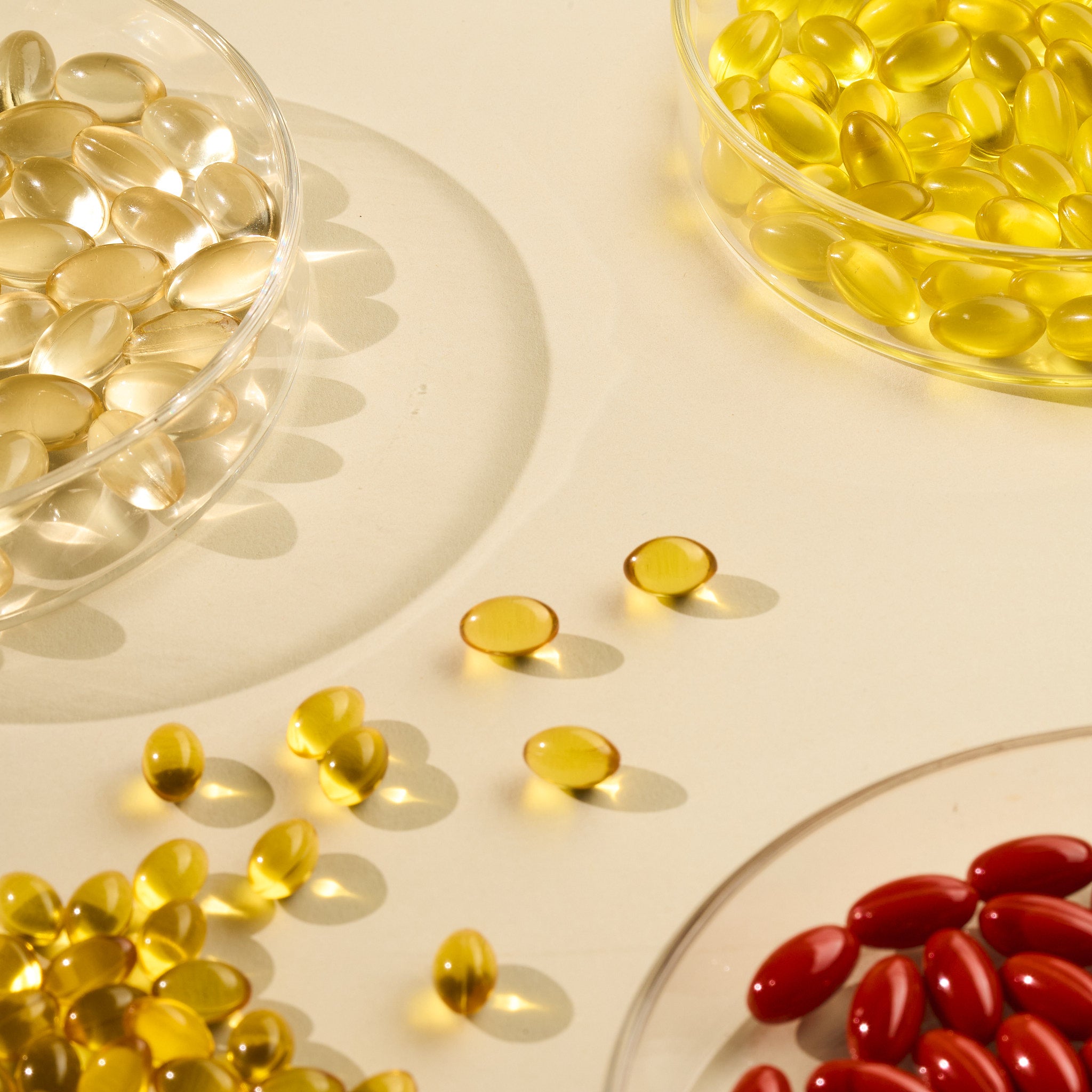Vitamin D has been getting a lot of attention lately. While it may not be a cure-all for the major illnesses plaguing our world today, it certainly deserves credit as an important player in the immunity game. But that’s far from the only benefit it offers!

A fat-soluble nutrient, vitamin D is unique in two key ways: first, it’s not really a vitamin at all – it’s a steroid hormone produced from cholesterol; and second, it can be synthesized by the body when skin is exposed to sunlight.2 It can also be obtained in small amounts from food sources like salmon, sardines, cod liver oil, tuna, beef liver, egg yolks, mushrooms, and fortified milk.1
Given that most of these sources are animal products, vegetarians and vegans don’t derive much vitamin D from food. And in western cultures, where people spend the majority of daylight hours inside and often wear sunscreen outside, preventing the natural synthesis of vitamin D, up to half the population may be deficient.
What exactly is the function of vitamin D in the human body anyway? Is deficiency a cause for concern? Read on to find out!
Spotlight on the Sunshine Vitamin
Immunity
Like other steroid hormones, vitamin D binds to designated receptors in cells throughout the body once it’s converted into its active form, calcitriol. After it binds to receptors, calcitriol can influence gene expression by turning certain genes on or off and causing changes within the cells. Immune cells that are responsible for defense against pathogens, including B cells, T cells, and antigen-presenting cells, have calcitriol receptors and respond positively to the presence of vitamin D. The hormone may also provide benefits for individuals who have autoimmune diseases.3
Calcium absorption
Vitamin D is probably most well-known for its role in calcium absorption. It influences three of the proteins involved in the transportation of calcium between cells, as well as contributing to the regulation of calcium levels in the blood to maintain homeostasis. This multitasking nutrient also regulates phosphorus levels and affects the activity of bone-synthesizing osteoblasts, promoting bone mineralization.
Muscle contraction
A 2010 study found that supplementation with vitamin D helped to improve the muscle function in elderly women who presented as weakest and slowest at the beginning of the study.4 As vitamin D breaks down, it produces a byproduct called 1,25(OH)2D, which travels to the nuclei of muscle cells and improves their ability to contract for greater strength.5
Heart health
Researchers have noticed an inverse relationship between vitamin D levels and blood pressure, though more studies are needed to find out if supplementation with vitamin D is helpful for lowering blood pressure levels. Certain properties of calcitriol show positive effects on heart health and function, and observational evidence suggests that vitamin D may have a hand in lowering the risk of cardiovascular disease.6
Kidney function
It’s common to see vitamin D deficiency in patients with chronic kidney disease, which suggests that vitamin D helps to maintain normal kidney function. New studies have found evidence to support the theory that vitamin D performs functions in the body that extend far beyond mineral homeostasis to include autocrine functions. This means that the nutrient influences cells to secrete hormones that bind to receptors on the same cells and stimulate positive changes. Healthy kidneys help to maintain optimal vitamin D levels in the body by converting inactive vitamin D into calcitriol.7
Neuroprotection
In recent years, vitamin D has been studied for its neuroprotective roles and its potential ability to help flush beta-amyloid out of the brain to prevent the onset of Alzheimer’s disease and dementia. Vitamin D receptors are found throughout the central nervous system, especially in areas responsible for cognitive function. Scientists believe that vitamin D may prevent neurodegeneration, and hope to figure out the effective concentration level of vitamin D in the body in the future.8
Mood regulation
Sub-optimal vitamin D levels often coincide with symptoms of depression, but it’s not just an interesting observation: Studies have shown that vitamin D can positively influence mood and counteract depression symptoms, maybe even as well as clinical antidepressants.9 This is likely due to vitamin D’s involvement in the synthesis of serotonin, a neurotransmitter that encourages feelings of happiness.10
When Skies Are Grey
Given the number of functions that vitamin D performs throughout the body, it’s not surprising that deficiency can lead to undesirable health consequences. Frequent sickness, fatigue, pain and loss of density in the bones, and symptoms of depression can all be expressions of low vitamin D levels. Deficiency left untreated for an extended amount of time can cause or contribute to heart problems, neurological and autoimmune disorders, serious infections, complications during pregnancy, and certain kinds of cancer.11,12
Nonwhite populations and people with intestinal disorders or disease of the kidney or liver are at higher risk of vitamin D deficiency. It’s also next to impossible for people who live 37 degrees north of the equator or higher, or 37 degrees south or lower, to get enough sunlight exposure throughout the year to maintain optimal vitamin D levels.13
The good news is that even if you don’t spend enough time in direct sunlight for your body to produce enough vitamin D naturally, it’s an easy nutrient to obtain through supplementation. NatureWise offers Vitamin D3 softgels that range in strength from 1,000 IU to 5,000 IU so that you can pick the dose that fits your needs! Formulated with extra virgin olive oil to improve bioavailability, our Vitamin D3 supplements are all natural, gluten free, and made without the use of GMO ingredients, additives, fillers, or binders.

The Hero or the Sidekick?
As important and multifunctional a nutrient as vitamin D is in its own right, it only influences one part of the bone formation process. To ensure that absorbed calcium binds to bones, the body needs vitamin K, which activates two specific proteins to promote the mineralization of the bones and teeth. When the body uses calcium properly, mineral deposits are prevented from building up and calcifying in the arteries. In this way, the functions of vitamin D and vitamin K benefit both the bones and the heart.
To make the most of your Vitamin D supplementation, pair it with vitamin K2! Coming soon from NatureWise, Vitamin K2 also promotes blood clotting activity and energy production, and provides antioxidant support for cellular defense against free radicals.*
Vital Functions
Vitamin D performs a number of vital functions throughout the body, promoting immunity, calcium absorption, muscle contraction, heart health, neuroprotection, and mood regulation. It may play an important role in maintaining normal kidney function and preventing Alzheimer’s disease. Deficiency in this vitamin that’s really a hormone may lead to sickness and infection, symptoms of depression, and in extreme cases, heart problems, autoimmune disorders, and neurological complications.
NatureWise offers Vitamin D3 supplements in various concentrations so that you can keep your vitamin D levels optimal no matter where you live or how much sunshine exposure your skin receives.* Keep an eye out for the arrival of Vitamin K2 from NatureWise and pair it with your Vitamin D3 to synergistically promote bone density and heart health!*

*These statements have not been evaluated by the FDA. These products are not intended to diagnose, treat, cure, or prevent any disease.
SOURCES
- https://www.healthline.com/nutrition/9-foods-high-in-vitamin-d
- https://www.healthline.com/nutrition/vitamin-d-101
- https://www.ncbi.nlm.nih.gov/pmc/articles/PMC3166406/
- https://www.medscape.com/viewarticle/734144
- https://brainmd.com/blog/9-vital-functions-vitamin-d/
- https://www.ncbi.nlm.nih.gov/pmc/articles/PMC3449318/
- https://ods.od.nih.gov/factsheets/VitaminD-HealthProfessional/
- https://www.ncbi.nlm.nih.gov/pmc/articles/PMC4553343/
- https://pubmed.ncbi.nlm.nih.gov/24732019/
- https://pubmed.ncbi.nlm.nih.gov/25713056/
- https://www.healthline.com/nutrition/vitamin-d-deficiency-symptoms
- https://www.medicalnewstoday.com/articles/161618
- https://www.health.harvard.edu/staying-healthy/vitamin-d-and-your-health-breaking-old-rules-raising-new-hopes
















